Coordinación
Una coordinación sólida puede evitar vacíos y duplicaciones en las respuestas humanitarias, así como garantizar que los PTM complementen otros tipos de asistencia. Sin embargo, el informe del «Estado Global de los Programas de Transferencias Monetarias» de la CALP Network muestra que la coordinación de la asistencia en efectivo es vista como débil y ad hoc, y que esto está teniendo graves repercusiones operativas.
Los donantes, las ONG y los líderes de los grupos de trabajo de transferencias monetarias (GTM) han pedido claridad sobre tres temas principales relacionados con la coordinación de la asistencia en efectivo:
- Quién debe ser responsable de asegurar una coordinación eficaz de la asistencia en efectivo;
- Cuál es la función y el mandato de los grupos de trabajo de transferencias monetarias, incluso en relación con las transferencias monetarias multipropósito;
- Cómo se debe dotar de recursos a la coordinación de asistencia en efectivo.
Tenemos que basarnos urgentemente en lo que funciona y proporcionar claridad a nivel mundial sobre las preguntas arriba mencionadas, adaptándonos a los diferentes contextos. Hace mucho tiempo que se deberían haber tomado decisiones claras basadas en necesidades operativas y no en la política de las agencias.
Prioridades actuales
El objetivo de la CALP Network es contribuir a seguir progresando en este tema en tres niveles: apoyar a los grupos de trabajo de transferencias monetarias a nivel regional; contribuir a soluciones prácticas para la coordinación de la asistencia en efectivo a nivel mundial; y convocar una discusión basada en la evidencia sobre temas clave, destacando puntos de decisión críticos y oportunidades de progreso.
Contenido destacado

Cash Coordination Tip Sheet
Guidelines and Tools
This tip sheet sets out established best practice, key guidance and resources for all aspects of cash coordination, intended as a clear, accessible and action-oriented guide for those engaged in coordination of cash and voucher assistance (CVA) at the field level.

Introducing the Cash Coordination Tip Sheet
Webinar
The CALP Network has developed a tipsheet setting out established best practice and key guidance and resources for all aspects of cash coordination, intended as a clear, accessible and action-oriented guide for those engaged in coordination of cash and voucher assistance at the field level.

Cash Coordination: A proposal from members in MENA
Blog Post
Earlier this year the CALP Network undertook regional consultations to explore options for cash coordination. This blog lays out recommendations from participants from the Middle East and North Africa who sketched out what cash coordination, and coordination more broadly, could look like in future to support a more effective, efficient and accountable response.
Últimos recursos

Surveying Livelihoods Service Delivery and Governance: Baseline evidence from Nepal
Report
In 2012/13, SLRC implemented the first round of an original cross-country panel survey in Nepal designed to produce information on: people’s livelihoods (income-generating activities, asset portfolios, food security, constraining and enabling factors within the broader institutional and geographical...
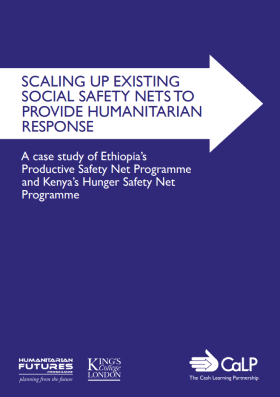
Scaling Up Existing Social Safety Nets to Provide Humanitarian Response: A case study of Ethiopia’s Productive Safety Net Programme and Kenya’s Hunger Safety Net Programme
Policy paper
A case study of Ethiopia’s Productive Safety Net Programme and Kenya’s Hunger Safety Net Programme. This thematic report has been undertaken as part of a 2013 research study entitled, Is Cash Transfer Programming ‘Fit for the Future’? The research was commissioned by the the CALP Network and...
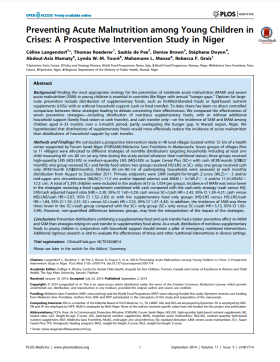
Preventing Acute Malnutrition Among Young Children in Crises: A prospective intervention study in Niger
Report
Governments and donor agencies need to know which preventative strategy is most effective, particularly among children under 2 years old who are most vulnerable to acute malnutrition. Here, the researchers compare the effectiveness of seven preventative strategies—including the distribution of...
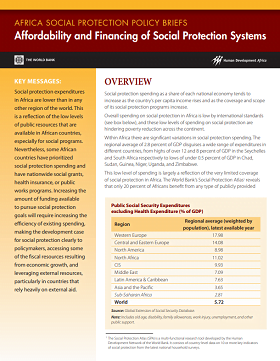
Africa Social Protection Policy Briefs – Affordability and Financing of Social Protection Systems
Report
Social protection spending as a share of each national economy tends to increase as the country’s per capita income rises and as the coverage and scope of its social protection programs increase. Overall spending on social protection in Africa is low by international standards (see box below), and these...

Market Analysis Guidance (MAG)
Report
The Market Analysis Guidance (MAG) suggests processes and tools aimed at integrating market analysis into the different phases of the project cycle, taking the existing Red Cross and Red Crescent (RC/RC) Movement’s technical documents into account whenever possible. The MAG was commissioned and...

Understanding the Demand for Financial Services in Nepal
Report
Nepal has a unique geography consisting of mountains, hills and Terai, which makes it difficult for any financial institution to provide financial services to every part of the country. Formal and informal financial service providers have been attempting to reach more customers at various levels and...

Estudio de caso: Programa de transferencia incondicional de efectivo emprendido a raíz del tifón Haiyan (Yolanda)
Informe
El tifón Haiyan, la tormenta más devastadora que jamás se había registrado, tocó tierra por primera vez en la mañana del 8 de noviembre de 2013 en Guiuan, en la provincia de Samar Oriental, lo que causó numerosas víctimas y daños significativos en las viviendas, los medios de vida y la...
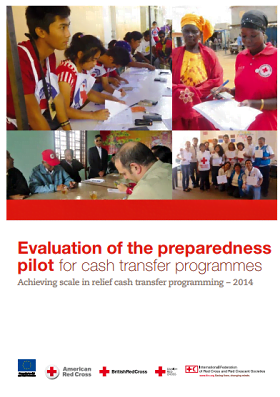
Evaluation of the preparedness pilot for cash transfer programmes – Achieving scale in relief cash transfer programming – 2014
Report
It is recognized that cash transfer programming can be effective in supporting populations affected by disasters in a way that maintains dignity and choice for beneficiaries while stimulating local livelihoods, economies and markets. However, the majority of cash transfer programming has been undertaken...
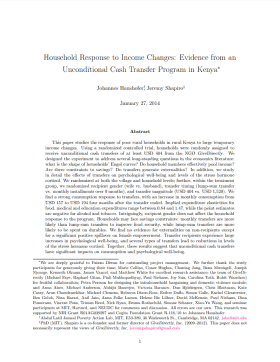
Household Response to Income Changes: Evidence from an unconditional cash transfer program in Kenya
Report
This paper studies the response of poor rural households in rural Kenya to large temporary income changes. Using a randomized controlled trial, households were randomly assigned to receive unconditional cash transfers of at least USD 404 from the NGO GiveDirectly. We designed the experiment to address...

Cash Transfers and HIV Prevention
Report
This paper proposes some initial principles on how to optimize HIV impacts of cash transfers, by encouraging targeting that: focuses on communities with high rates of new HIV infections, particularly acquired via sexual transmission; reduces local or community levels of economic inequalities between men...
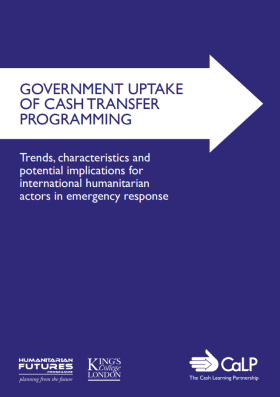
Government Uptake of Cash Transfer Programming: Trends, characteristics and potential implications for international humanitarian actors in emergency response
Policy paper
Trends, characteristics and potential implications for international humanitarian actors in emergency response. This thematic report has been undertaken as part of a 2013 research study entitled, Is Cash Transfer Programming ‘Fit for the Future’? The research was commissioned by the the CALP...
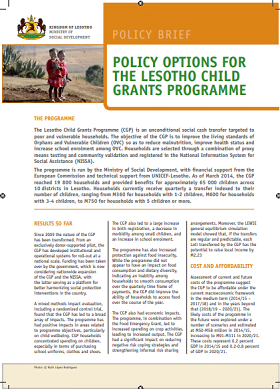
Policy brief – Policy options for the Lesotho Child Grants Programme
Policy paper
The Lesotho Child Grants Programme (CGP) is an unconditional social cash transfer targeted to poor and vulnerable households. The objective of the CGP is to improve the living standards of Orphans and Vulnerable Children (OVC) so as to reduce malnutrition, improve health status and increase school...
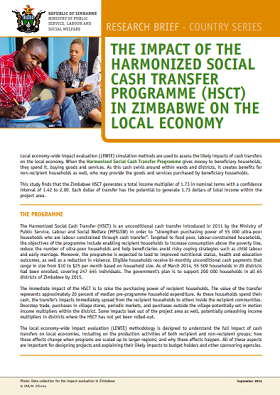
The Impact of the Harmonized Social Cash Transfer Programme (HSCT) in Zimbabwe on the Local Economy
Report
Local economy-wide impact evaluation (LEWIE) simulation methods are used to assess the likely impacts of cash transfers on the local economy. When the Harmonized Social Cash Transfer Programme gives money to beneficiary households, they spend it, buying goods and services. As this cash swirls around...

Philippines Typhoon Appeal: Contribution to Change Evaluation
Report
Typhoon Yolanda (known internationally as Haiyan), hit Eastern Samar, Leyte and Central Visayas in the Philippines on November 8, 2013, and is one of the strongest typhoons ever recorded. A total of 16 million people were affected; 6,300 died, 4.1 million were displaced, and 1.1 million houses were...
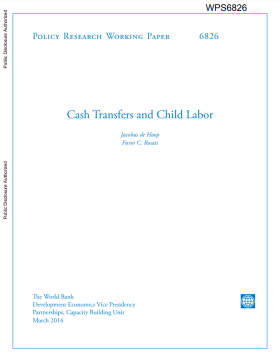
Cash Transfers and Child Labor
Policy paper
Cash transfer programs are widely used in settings where child labor is prevalent. Although many of these programs are explicitly implemented to improve children’s welfare, in theory their impact on child labor is undetermined. This paper systematically reviews the empirical evidence on the impact of...
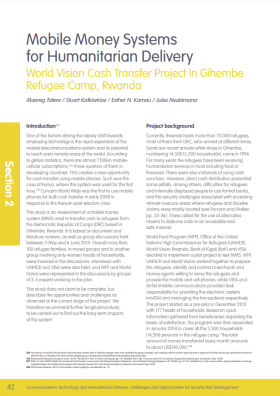
Mobile Money Systems for Humanitarian Delivery: World Vision cash transfer project in Gihembe refugee camp, Rwanda
Report
One of the factors driving the steady shift towards employing technology is the rapid expansion of the mobile telecommunications system and its potential to reach even remote areas of the world. According to global statistics, there are almost 7 billion mobilecellular subscriptions, three-quarters of them...

Cruz Roja Chilena: Proyecto piloto de preparación para la elaboración de programas de transferencias monetarias
Informe
La Federación Internacional trabajó con las Sociedades Nacionales de los cuatro países piloto entre mayo de 2012 y diciembre de 2013 para que estas pudieran ejecutar programas de transferencias monetarias a amplia escala con el fin de atender las necesidades de socorro con mayor celeridad y en...

Social Transfer Programme in Nepal: An overview
Presentation
A overview of the social transfer programme in Nepal.
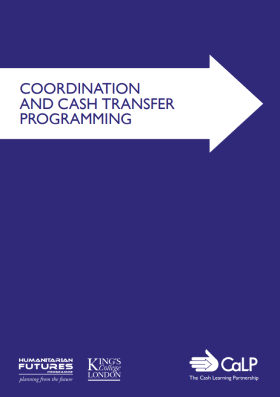
Coordination and Cash Transfer Programming
Policy paper
This thematic report has been undertaken as part of a 2013 research study entitled, Is Cash Transfer Programming ‘Fit for the Future’? The research was commissioned by the the CALP Network and undertaken by the Humanitarian Futures Programme (HFP), King’s College London. The overall...
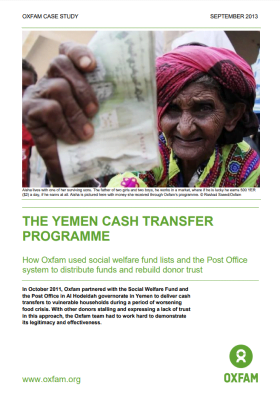
The Yemen Cash Transfer Programme
Report
This case study shows how Oxfam used social welfare fund lists and the Post Office system to distribute funds and rebuild donor trust. In October 2011, Oxfam partnered with the Social Welfare Fund and the Post Office in Al Hodeidah governorate in Yemen to deliver cash transfers to vulnerable households...